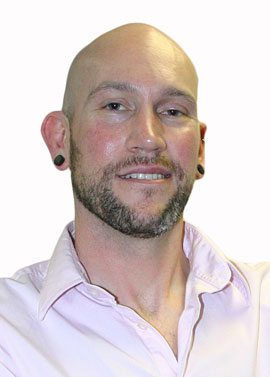HIV/AIDS support group at Cathedral of Hope celebrates its 1st anniversary with a World AIDS Day event that includes Quilt panels
DAVID TAFFET | Staff Writer taffet@dallasvoice.com
A year ago, Todd Faulk created an HIV/AIDS support group as part of the Cathedral of Hope outreach ministries. But it’s not a Bible study, and it’s not a religious group.
Faulk notes that he’s not a licensed counselor, and he’s not a pastor. The group is there to help people living with HIV feel better about themselves.
Still, Faulk said, he felt — and he had heard others say — that as the largest LGBT church in the area, Cathedral of Hope should offer an HIV support group.
Such groups were more common in the early 1990s, before drugs that helped control the virus became available. But Faulk saw a need. He said people had questions, especially young people.
When Faulk volunteered to become the face of the group, he turned that word into an acronym for Faith, Acceptance, Caring, Educate.
He said that the goal was support and information, not fellowship, so before calling the first meeting, he looked for some curriculum. He couldn’t find any, so he turned to area professionals.
Faulk knew Legacy Counseling Center Executive Director Melissa Grove because he turned to Legacy when he was first diagnosed a dozen years ago. So he approached her, and Grove provided him with a number of topics for meetings and referred a number of people to the group.
“They’ve done a fantastic job,” said Grove said of F.A.C.E. “Any person going to the group would be welcomed with open arms.”
She said that while Legacy provides individual counseling and therapeutic groups, and other AIDS service organizations offer other services, F.A.C.E. fills a void.
“A support group doesn’t need to be led by a licensed professional,” she said.
Grove raved about the job Faulk has done. Before the group began, she worked with him on facilitating skills and how to create a safe environment.
“If a leader can’t do that, people won’t talk,” she said.
She said it was important for Faulk to recognize when someone might need something more than a support group, and over the past year they have referred people back and forth from her therapy to his support.
Dr. Nick Bellos and his nurse practitioner, Stephanie Shoemaker, usually attend two sessions a month to answer medical questions.
“We’re there in case people have questions about their drugs,” said Bellos.
He said they especially discuss side effects.
“We tell folks what’s out there and available,” he said.
Bellos also provides information about clinical trials in the area. Recently he gave the group information on life expectancies and co-morbidities, discussing HIV-related diabetes and hypertension.
His job isn’t diagnosing at the group, but if Bellos hears something that sounds like it needs to be examined, he sends the group member to his doctor.
Bellos complimented Faulk on the way he runs the group.
“He does a great job keeping the group on track,” Bellos said. “He makes sure everyone has an opportunity to speak.”
Faulk said some people attend a few meetings, get what they need from the group and move on. Others have become regulars. And while the goal is to help people with HIV live better lives, the death of one member soon after F.A.C.E. formed reminded everyone of how serious HIV can be.
“He developed spinal meningitis and died in less than a week,” Faulk said. “His family didn’t even know he was positive.”
That left the man’s partner with the job of explaining the illness to the family.
Since then, that member’s mother has attended, first for support after her son’s death and then to help others come out to their families as HIV-positive and, when necessary, as gay.
Other parents have participated to get information and to support their HIV-positive sons. Parents from out of town have attended and left with confidence that their child was getting the support needed, Faulk said.
In addition to coming out and medical issues, Faulk said group members have dealt with a variety of other related topics, like “eating habits, how the food you’re eating affects your medication.”
Faulk said someone might mention that he has a reaction when he eats a particular food. And another group member will say he has noticed a similar reaction.
“I call that the ‘me, too’ factor,” said Grove. “It’s very important in decreasing isolation.”
Faulk said those sort of things are important because living with HIV requires a lifestyle change. He said he learned in the group that regular antacids block the body from properly absorbing HIV medications. He said his doctor gave him something to use instead.
“We talked about a recent study that showed that cocaine actually increases the amount of HIV in the body by lowering the immune system,” Faulk said.
Other topics have included acceptance, setting goals, the importance of physical activity, positive thinking and getting away from a “woe is me” feeling.
World AIDS Day marks the one-year anniversary of F.A.C.E., as well as the 10th anniversary of the John Thomas Bell Tower. F.A.C.E. helped coordinate the World AIDS Day event at the Cathedral.
The Rev. Paul Tucker, who was the Cathedral’s first AIDS chaplain, will lead the service. He is now a pastor at All God’s Children Metropolitan Community Church in Minneapolis.
The Turtle Creek Chorale will perform.
Panels from the quilt will be on display in the International Peace Chapel and HIV testing coordinated with Resource Center Dallas will be available throughout the day.
Cathedral of Hope, 5910 Cedar Springs Road. Dec. 1 at 7:15 p.m.
This article appeared in the Dallas Voice print edition November 26, 2010.














